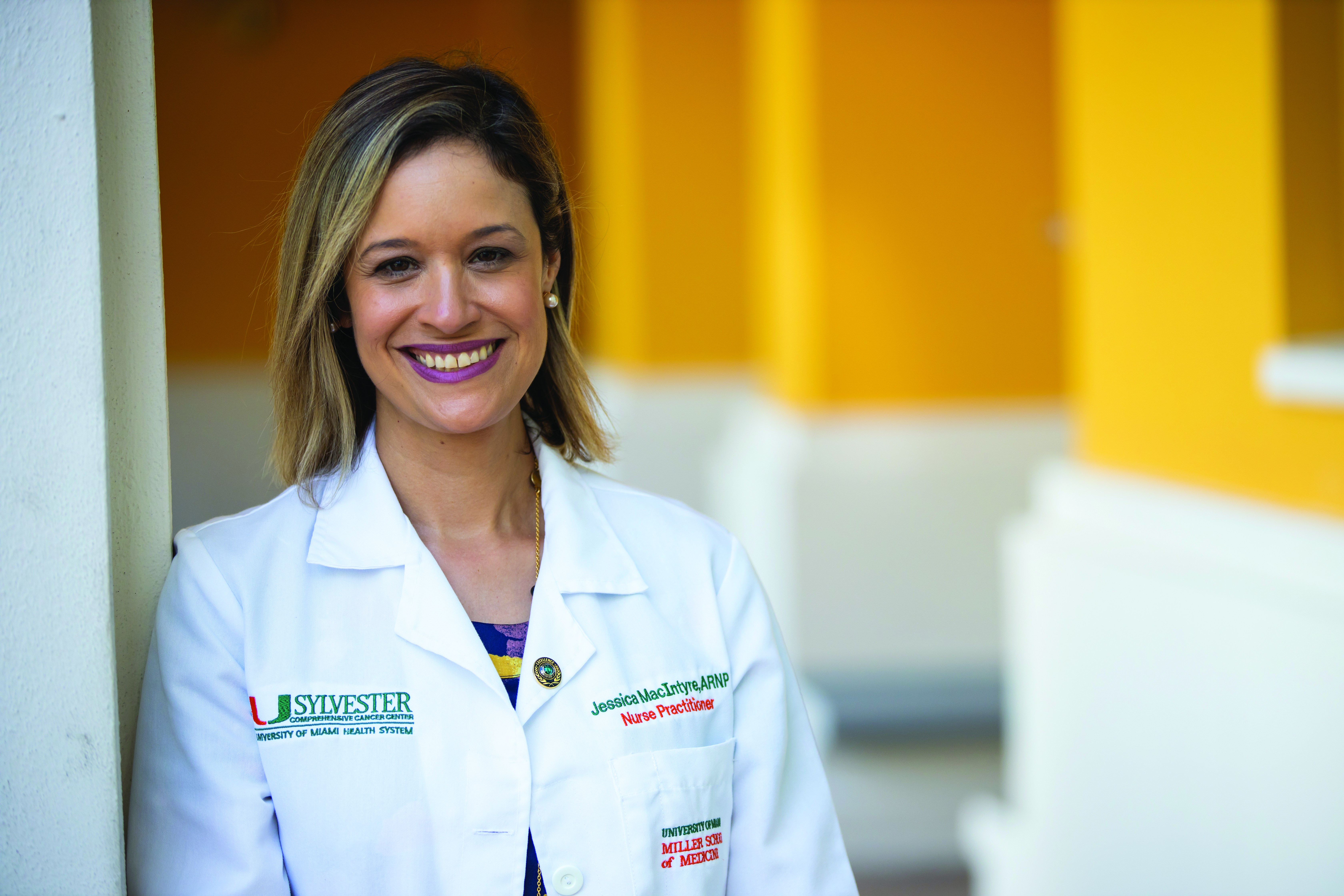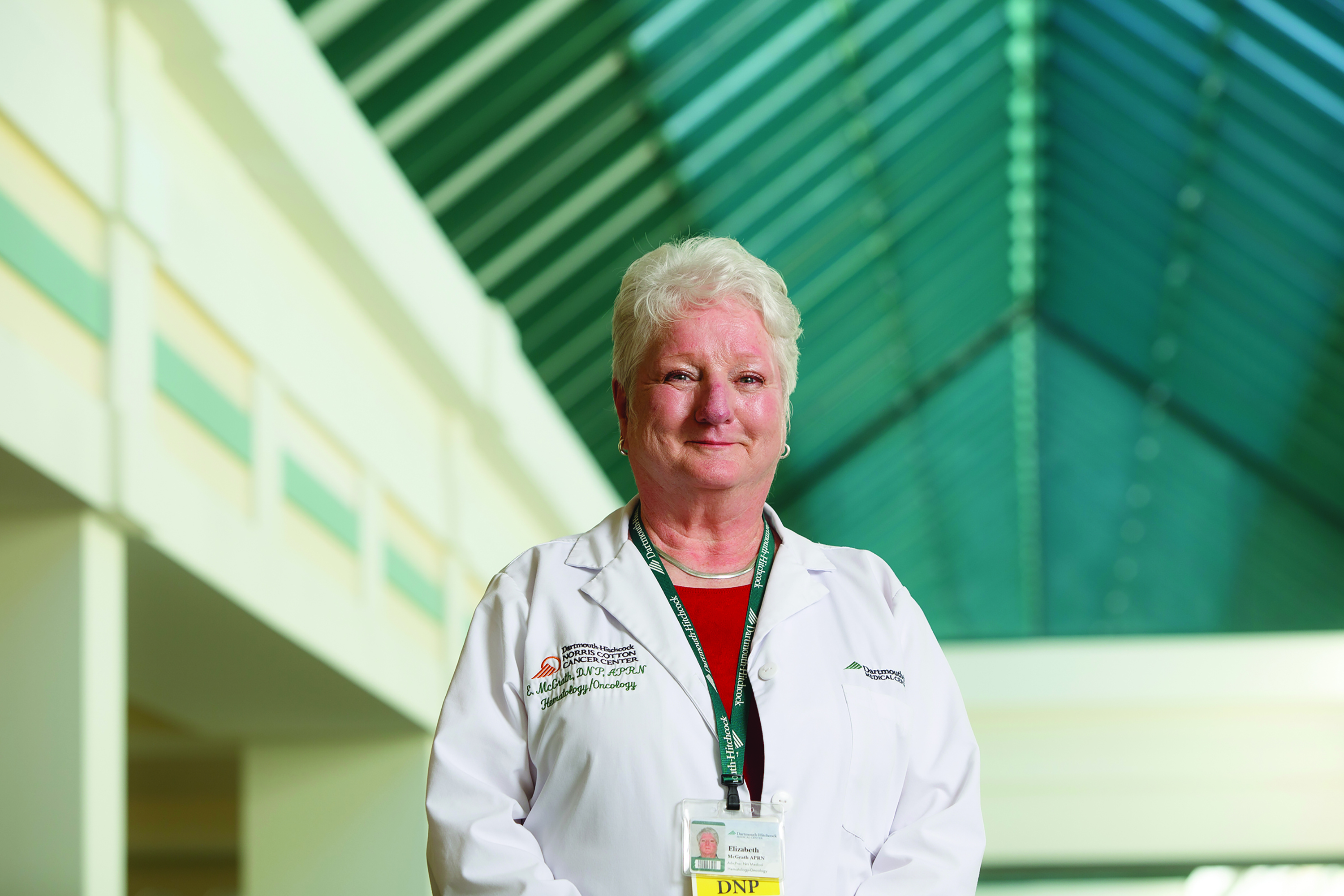Nurse-Led Survivorship Programs
Survivors need support to resume a high-quality, healthy “new normal” life after they complete their treatment. The services of a cancer survivorship clinic or program (https://www.mayoclinic.org/departments-centers/oncology/cancer-survivorship-clinics/overview) may help them manage the physical and emotional implications involved with ongoing care.
According to the National Cancer Institute (NCI), an estimated 18.1 million cancer survivors (https://cancercontrol.cancer.gov/ocs/statistics) are living in the United States as of January 2022, and that number is projected to increase to 22.5 million by 2032 (https://cancercontrol.cancer.gov/ocs/statistics)—with 16.3 million of those living five or more years beyond their diagnosis. Formalized survivorship programs equip oncology professionals to care for that population’s unique needs.
“Survivorship programs have become a critical resource for cancer centers because of the increased number of cancer survivors, shortage of practitioners, and the population’s multifaceted needs,” ONS member Jessica MacIntyre, DNP, MBA, APRN, AOCNP®, executive director of clinical operations and advanced practice RN at Sylvester Comprehensive Cancer Center in Miami, FL, and member of the Miami-Dade ONS Chapter, said. “More awareness and creation of cancer survivorship programs can ensure that patients have the resources available to help them at the beginning, middle, and end of their cancer journeys.”

“If we use the definition that a patient is considered a cancer survivor from the diagnosis of cancer throughout the balance of their life, and if we take into account improvements in cancer therapeutics and outcomes, people are living longer with the disease or sequela of treatment,” ONS member Elizabeth B. McGrath, DNP, APRN, AGACNP-BC, AOCNP®, ACHPN, nurse practitioner and director of survivorship at Dartmouth Cancer Center in Lebanon, NH, and member of the New Hampshire/Vermont ONS Chapter, said. “Oncology nurses are obliged to offer comprehensive survivorship services to these individuals. The challenge is determining what those programs look like and how we ensure equal access, especially in underserved areas.”
Nurses Leading Survivorship Programs
Oncology nurses can help identify cancer survivors, refer them to cancer survivorship programs or other services, disseminate survivorship care plans (SCPs), and provide ongoing support, education, and resources throughout a patient’s cancer journey, MacIntyre said. Nurses can also serve as quality improvement leaders on survivorship committees to drive positive changes for patients and survivors.
“Nurses are also the most trusted profession (https://news.gallup.com/poll/388649/military-brass-judges-among-professions-new-image-lows.aspx), and cancer survivors feel more comfortable addressing sensitive survivorship issues like sexual health, relationships, and body image in a safe environment with someone they have developed rapport with,” MacIntyre said.

McGrath added that oncology nurses can educate patients with cancer and survivors on the care they received and the importance of promoting a heathy lifestyle, monitoring for cancer recurrence, and identifying and managing long-term and late effects.
“The nurse is uniquely positioned to view survivorship care within a holistic framework and quality-of-life model (https://doi.org/10.1007/bf00634747) focuses on the whole person, including physical, social, psychological, and spiritual well-being,” McGrath said.
MacIntyre said that because of the increased demand for survivorship services, many oncology nurse practitioners at Sylvester Comprehensive Cancer Center have also been providing survivorship care to patients. “We have seen how nurses and advanced practice providers (APPs) take the time to address many survivorship concerns that our physician colleagues cannot address in a 15- to 20-minute follow-up appointment,” she said. “APPs and nurses are an adjunct to our oncologists so that patients can feel supported throughout their survivorship journey.”
Additionally, staff nurses have a vital role in survivorship care programs at MacIntyre’s institution, where they provide education and resources to patients and their families and caregivers.
“For example, our radiation therapy staff nurses have referred many patients to the survivorship program—they are the highest referring department at our organization,” MacIntyre said. “They also help patients navigate survivorship care and contact our survivorship program to ensure that care has been coordinated.”
Members of the interprofessional survivorship care team can come from a variety of backgrounds, including palliative care, internal medicine, rehabilitation medicine, and physical therapy at MacIntyre’s institution. At McGrath’s institution, nurse navigators often sit on committees, transition patients to other providers, and guide the survivorship program about patients’ needs during the transition. Healthcare professionals in surgery, psychiatry, chaplaincy, social work, community outreach, and additional disciplines also work with the nurses leading survivorship programs.
Improve Access to Survivorship Care Plans
The Commission on Cancer’s (COC’s) 2016 Survivorship Standard (https://ascopost.com/issues/april-10-2016/new-commission-on-cancer-standards-clarifies-and-emphasizes-process-quality-data-reporting-and-more) mandated that a percentage of analytic cancer cases be provided with SCPs, although MacIntyre explained that survivorship and adjunct services were already imbedded at her cancer center. However, MacIntyre said that a more formal program helped standardize workflows so that all patients, not just those with analytic cases, were provided with survivorship care and care plans.
“As a result, we have increased awareness and support around survivorship care, and many of our providers and staff are now involved with our program,” MacIntyre said. “Furthermore, when COC later removed the percentage requirement, many centers were able to develop survivorship programs tailored to their community without focusing their resources on SCP delivery requirements.”
MacIntyre’s role in the survivorship program is to provide clinical programmatic oversight and to bridge the work between bedside and clinical operations and the survivorship research team. She also oversees APPs who provide survivorship care.
The survivorship program at Sylvester Comprehensive Cancer Center offers support groups, art and music therapies, massages, acupuncture, nutrition, psychology and psychiatry services, exercise physiology, yoga, chaplaincy, and social work services—some as combination programs. For example, MacIntyre explained that the yoga and music therapy teams created a shared program. Most of the services are complimentary for survivors, which MacIntyre said supports the cancer center’s mission of providing adjunct cancer services to the community.
“What makes our survivorship program unique is that we have strong leadership and community support for building more programs and initiatives surrounding survivorship care,” MacIntyre said. She explained that her institution built relationships with local and national advocacy groups and nonprofit organizations that provide financial and other resources for patients, survivors, and their families and caregivers.
“We also recruited leaders in survivorship care from across the country dedicated to researching areas such as exercise, nutrition, and disparities surrounding access to survivorship care, and we’re looking into how technology and digital devices can help us answer some key research questions,” MacIntyre said.
Promote Health and Education
At Dartmouth Cancer Center’s nurse-led survivorship program, McGrath is responsible for meeting the COC standard for survivorship and sits on her institution’s steering committee. When McGrath joined the cancer center in 2015, the Advanced Practice Nurse Cancer and Related Event Survivorship Program was in place, an infrastructure for clinicians and researchers to provide physical, psychological, social, and spiritual support to cancer survivors and their families.
“The mission is to strive for excellence in patient-centered care through promotion of wellness, education, and research; improve clinical practice; and optimize cancer survivors’ quality of life,” McGrath said.
Dartmouth Cancer Center’s nurse-led survivorship program provides a full range of services, including:
- Access to cancer prevention and screening resources and survivorship research opportunities
- Cancer- and treatment-related symptom management
- Consultations with subspecialty experts
- Education and support programs for survivors, families, and healthcare professionals
- End-of-treatment summaries for patients and primary care providers
- Smoking cessation care
“My institution spent much of the past decade focusing on end-of-life treatment summaries,” McGrath said. “In addition, consultative services were offered to APRNs specializing in some of the symptom management and cancer- and treatment-related effects of survivorship such as peripheral neuropathy, sexual dysfunction, hot flashes, and cognitive and rehabilitation.”
Dartmouth Cancer Center’s nurse-led survivorship program also offers a complementary care program (http://cancer.dartmouth.edu/patients-families/complementary-care-program), and other ongoing education programs include cooking, creative writing, yoga, and even rowing classes.
“Our future looks more viable and ubiquitous,” McGrath said. “I think that is key. With data from providers, allied health members of the interprofessional team, patients, and caregivers, we have information with which to begin planning for our future. Initial impressions are that the program needs more visibility, more staff and patient education, and centralized patient information on the website. We also need to standardize documentation in the electronic health record to improve quality, ensure continuity of care, and facilitate billing and data management.”
Implement a Nurse-Led Survivorship Program at Your Institution
Survivorship programs should align with patient needs, and MacIntyre and McGrath agreed that future programs must answer important and relevant research questions surrounding survivorship care and integrate innovation and technology. Taking a nurse-led quality improvement approach can improve the programs and support patients’ and families’ evolving needs.
“Reach out to existing programs,” McGrath urged. “Everyone is striving to be better and willing to share. And remember, no program is one size fits all.”
Both advised nurses developing their own programs that survivorship care must serve different populations across their communities and eliminate health disparities. Use the resources and keys for program success in the sidebars as you build and implement your survivorship care programs and clinics.
“Emphasis on survivorship care is becoming more of a relevant topic, and we should focus priority in this area,” MacIntyre said. “One quote that always reminds me of the importance of survivorship care came from Fitzhugh Mullan (https://www.nejm.org/doi/full/10.1056/NEJM198507253130421), who was a physician who survived cancer and a leader of the National Coalition for Cancer Survivorship. He said (https://www.nejm.org/doi/full/10.1056/NEJM198507253130421), ‘It is as if we have invented sophisticated techniques to save people from drowning, but once they have been pulled from the water, we leave them on the dock to cough and splutter on their own in the belief that we have done all that we can.’
“Let’s not leave our cancer survivors to splutter. Let’s provide them the care to survive beyond their cancer with all the support available.”
